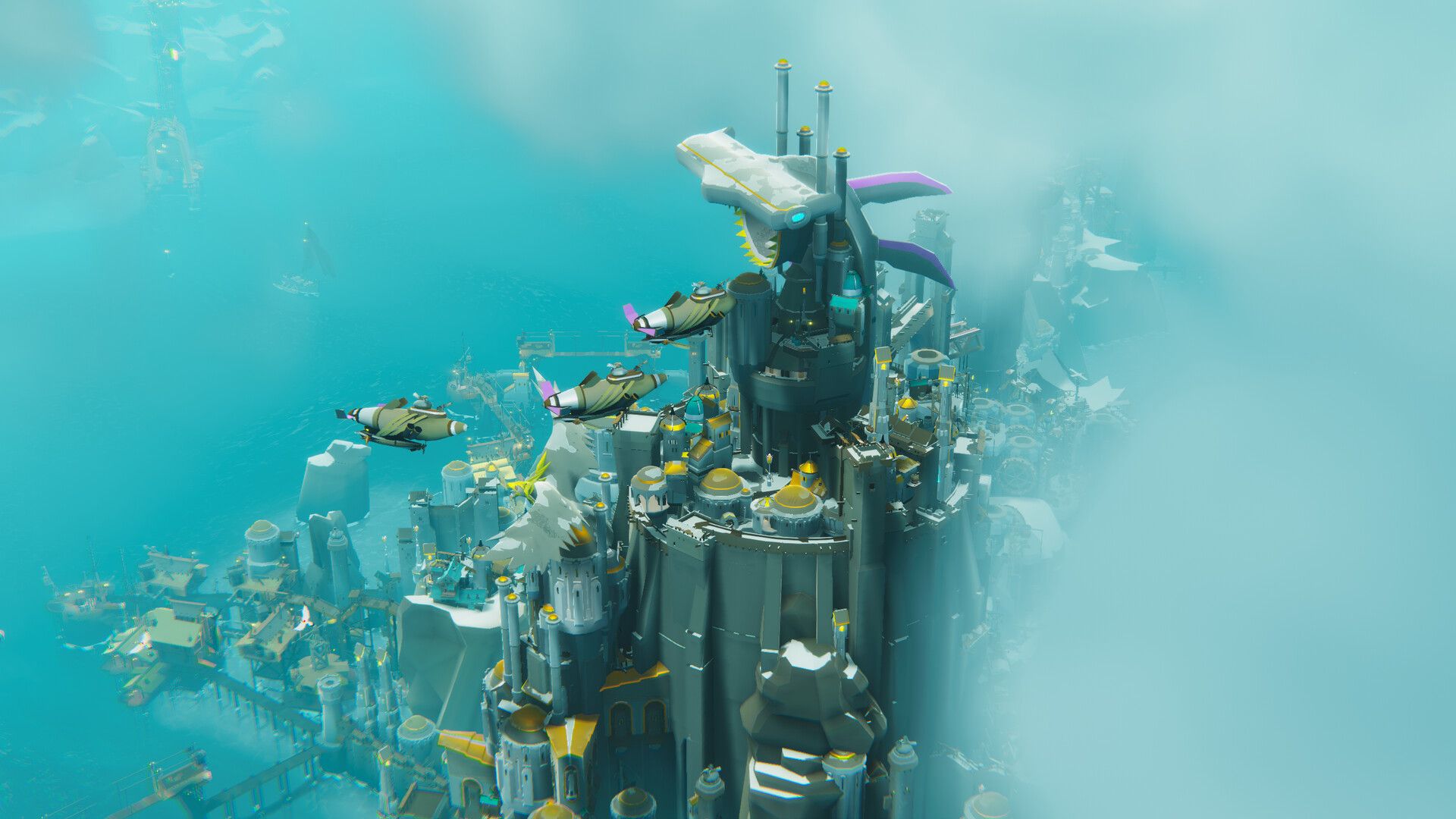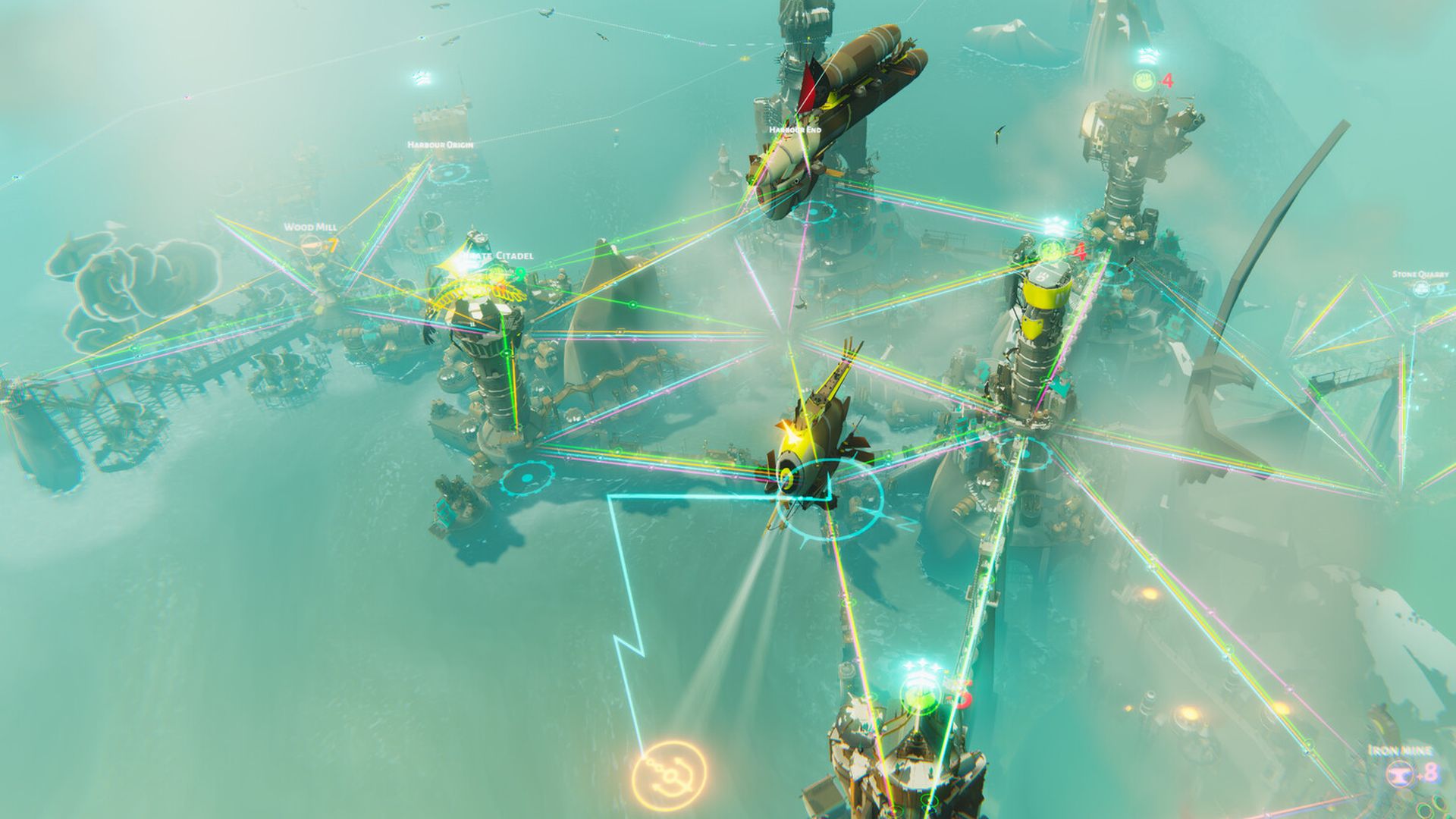
The Ursee, the maritime setting upon which Bulwark: Falconeer Chronicles has you create your burgeoning cities, is an unsettling place. Towering cliffs and rolling thunderstorms create a threatening atmosphere, and as your first few buildings cling limpet-like to the rock face, there's a sense of grit, danger, and a life hard-won.
But for all the ways in which the world of Bulwark - a city building spin off from the developer of aerial combat game The Falconeer - makes you feel unwelcome, it offers a surprisingly accommodating twist on city-building convention. Rather than worry too much about whether you have the resources you need to craft new buildings, Bulwark is more interested in whether you can move those resources around. For example, if you're mining iron at one end of your colony, your workers will only be able to move it through so many different structures before the supply chain collapses.
That results in two design choices that I really like. One is the blend of order and chaos, where there's a need to think about how different parts of the city connect up, even as Bulwark strives to let you grow organically, spreading across whatever outcrops you can find like lichen. Attached to that is the second tool, whereby your supply chains spread through your settlement, visualized like multicolored guitar strings stretched down a fret board. The further you stretch the supply, the less secure it becomes, vibrating chaotically before the logistics collapse and the materials can go no further. It's a little tricky to determine exactly how to take different resources into new parts of the city, but the burst of color the system provides is a surprisingly good fit amid the sombre tones of the Ursee.
Thankfully, whether or not I can successfully move my supplies around the city with Bulwark's 15-building demo limit doesn't appear to impact my absolute favorite part of this game - its towers. The way that Bulwark's cities cling to their setting means that you have to spread a lot of building over very little space, which means building up more than building out. To enable that, it's often Foundations, not actual buildings, that you'll use to spread across the rock face.

Those Foundations are used to stabilize your vertical expansion, but each part of that equation seems to grow almost at random with each addition. I can pick the direction that I want to build my Foundation in, but not exactly how it manifests. The result is a mystery polygon that seems to grow out of ground before building up around the base of a tower, upon which the cycle repeats - if you want to upgrade the towers that are a crucial part of each city, you'll use the Foundations to lift them higher, the same almost random process of development unfolding each time. A tower might simply thrust upwards into the sky, a narrow spire pointing upwards, but at the next upgrade it might grow in heft, cylindrical or blocky protuberances filling it out. The higher you go, the more Foundations you need, and the result is an ever-evolving structure that seems to grow almost organically, any surface that can hold up an additional structure helping flesh out the city. It's almost bacterial, this spreading, evolving system of growth on top of growth, yet strangely brutalist, blocky bastions jutting chaotically out of the rockface.
I've definitely not unlocked everything that Bulwark has to offer just yet. In part, that's because the building limit in the currently-available demo caps at just 15, so my creations couldn't sprawl quite as much as I'd like. But there's a puzzle-y element to this city-builder that I was very keen to dig into more, if nothing else than to get the colorful lines depicting my resource allocation a little more uniform. But the two systems at its heart have definitely allowed Bulwark to get its hooks into me, at the start of what could be an intense affinity for the world of the Ursee. You can check out Bulwark: Falconeer Chronicles right now thanks to its Steam demo.
Could this be a new contender for our list of the best city building games?
Sign up to the GamesRadar+ Newsletter
Weekly digests, tales from the communities you love, and more

I'm GamesRadar's news editor, working with the team to deliver breaking news from across the industry. I started my journalistic career while getting my degree in English Literature at the University of Warwick, where I also worked as Games Editor on the student newspaper, The Boar. Since then, I've run the news sections at PCGamesN and Kotaku UK, and also regularly contributed to PC Gamer. As you might be able to tell, PC is my platform of choice, so you can regularly find me playing League of Legends or Steam's latest indie hit.


